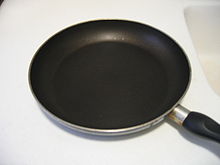 More bad news about the toxic class of chemicals called PFAS chemicals, which are used in a wide variety of consumer products, such as Teflon non-stick cookware and Scotchgard. The problem is that the chemicals don't stay in the products, but leach out (migrate out) and spread further - even into us. Unfortunately these chemicals persist in the environment. Earlier studies had already detected PFAS (per- and polyfluoroalkyl substances) chemicals in water, soil, some foods, and in the bodies of almost all Americans. Now some recent research studies and the efforts of investigative journalists have uncovered more disturbing findings about the spread of these chemicals in the environment, in foods, and us.
More bad news about the toxic class of chemicals called PFAS chemicals, which are used in a wide variety of consumer products, such as Teflon non-stick cookware and Scotchgard. The problem is that the chemicals don't stay in the products, but leach out (migrate out) and spread further - even into us. Unfortunately these chemicals persist in the environment. Earlier studies had already detected PFAS (per- and polyfluoroalkyl substances) chemicals in water, soil, some foods, and in the bodies of almost all Americans. Now some recent research studies and the efforts of investigative journalists have uncovered more disturbing findings about the spread of these chemicals in the environment, in foods, and us.
The site Intercept has done a series of investigative reports highlighting these new findings about PFAS chemicals For example, these chemicals are found in fertilizers that contain sewage sludge (or biosolids) that farmers use on their farms. Farmers have been been doing this for decades. And it's in milk from dairy farms that spread this compost (fertilizer) made from sewage sludge on their fields. Of course! What is spread on the fields gets into food and which humans then ingest. The chemicals are also found in breastmilk from women in every country that has been studied.
Environmental Working Group (EWG) also has a series of articles on these chemicals, including the results of a recent FDA study of foods. The FDA found PFAS in many foods, including meat, seafood, dairy products, sweet potatoes, pineapples, leafy greens, and chocolate cake with icing. But the FDA has not publicly disclosed the results. Why not? Especially since the EPA has already said that "dietary exposure" (what we eat) is a main way that people get these chemicals into their bodies.
Why should we be concerned? PFAS chemicals are called by some as "persistant chemicals" because of their persistence in the environment and humans. PFAS chemicals are linked to all sorts of serious health risks, including reproductive harm (e.g.poorer semen quality), cancers, lowered sex and growth hormones in children, immune effects, thyroid disease, liver and kidney damage, and high cholesterol.
PFAS chemicals (such as PFOA, PFOS, PFBS) are used in a wide variety of consumer products because they have stain, water, and grease repellent properties. They are used in nonstick cookware, in food packaging (especially the paper wrappers and cardboard containers), stain-resistant carpets, furniture, floor waxes, textiles, water-proof and stain-resistant clothing (such as Gore-tex fabric), and performance gear. Remember Teflon? That's one. Some have been banned, phased out of use because of their dangers, but the replacements appear to be just as bad. The chemicals migrate out of food packaging into food, or can be released into the air and dust from carpets and upholstery treated with stain-resistant coatings.
I want to point out that sewage sludge (also called biosolids), are found in many commonly available fertilizers, such as Milorganite fertilizer. It's not just farmers who've been using the stuff for years. Note that organic fertilizers and organic farmers can NOT use sewage sludge (biosolids). It turns out that even compostable food containers contain PFAS chemicals that leach out. Yikes!
What can you do to lower exposure to PFCs? These are chemicals that are hard to totally avoid, but one can lower exposure to them. And some have been phased out. The good news is that research shows that after a while levels in blood and breast milk should drop. What to do?? First of all, don't use non-stick pots and pans, and definitely not older Teflon ones. Use stainless steel or cast iron instead. Avoid the use of non-stick smooth dental floss made with a "non-stick" coating such as Oral-B Glide dental floss (use plain waxed or unwaxed floss instead). Try to not eat prepared foods in coated containers frequently. Avoid Scotchgard or other stain-proofing or stain-resistant treatments on upholstered furniture or rugs. Avoid water-proof treated fabric. It's also best to avoid drinking PFAS-contaminated water (which may be hard to do in places such as NJ where so much of the water supply is contaminated by PFAS chemicals).
From the Intercept - TOXIC PFAS CHEMICALS FOUND IN MAINE FARMS FERTILIZED WITH SEWAGE SLUDGE ...continue reading "Why Are We Still Using These Dangerous Substances In Consumer Products?"
 Finally, some good news (perhaps) regarding the damaging, unregulated, and widely used PFAS (per- and polyfluoroalkyl substances) chemicals. PFAS are man-made chemicals commonly called "forever chemicals" because of how they stick around, persist, and contaminate both humans and the environment. Including our communities, our drinking water (at least 2411 drinking water systems), and military installations.
Finally, some good news (perhaps) regarding the damaging, unregulated, and widely used PFAS (per- and polyfluoroalkyl substances) chemicals. PFAS are man-made chemicals commonly called "forever chemicals" because of how they stick around, persist, and contaminate both humans and the environment. Including our communities, our drinking water (at least 2411 drinking water systems), and military installations.